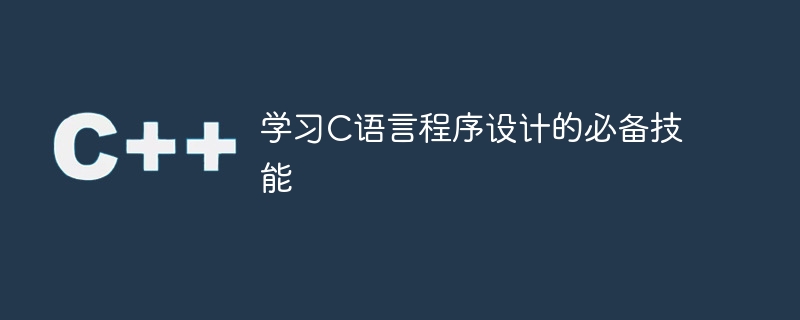

Essential skills for learning C language programming
C language is a high-level programming language widely used in computer programming. It is widely used in the computer field due to its simplicity and efficiency. Whether it is embedded systems, operating systems, game development or application development, C language plays a vital role. However, learning C language programming is not an easy task. It requires mastering some necessary skills to help learners quickly master and use the language. In this article, we will discuss the necessary skills to learn C programming.
First of all, mastering basic programming concepts is the basis for learning C language programming. Regardless of the programming language, programming concepts are universal. Therefore, before learning C language, it is very important to understand the basic operating principles of computers and understand programming concepts such as variables, data types, flow control statements, and functions. Mastering these basic concepts will make it easier for learners to understand and apply C language-related knowledge.
Secondly, being familiar with the grammatical rules of C language is another essential skill for learning C language programming. The grammatical rules of C language are relatively simple, but there are also some areas that are easily confused and error-prone. Learners need to firmly grasp the grammatical rules of C language, especially the declaration and definition of variables, the use of operators, and the writing of control statements and other grammatical points. Familiarity with the syntax rules of C language will make learners more comfortable when writing and debugging programs.
Third, learning to use the standard library functions of C language is an important part of learning C language programming. C language provides a wealth of standard library functions, which can help programmers quickly complete some common tasks, such as input and output, string operations, mathematical calculations, etc. Learners should be familiar with the use of standard library functions, master the parameters and return values of commonly used functions, and flexibly use these functions to solve practical problems.
Fourth, understanding and using pointers is one of the key skills for learning C language programming. Pointers are a major feature of the C language, which can improve the efficiency and flexibility of the program. Learners should understand basic knowledge such as the concept of pointers, pointer declaration and initialization, pointer operations, and the relationship between pointers and arrays, and be able to correctly use pointers to solve practical problems.
In addition, good programming habits and effective debugging skills are also necessary skills for learning C language programming. Good programming habits include naming conventions, code indentation, comment conventions, etc. These habits can make the code more readable and maintainable. Effective debugging techniques include using a debugger, adding debugging output statements, single-step debugging, etc. These techniques can help learners quickly locate and solve errors in the program.
In short, learning C language programming requires some necessary skills to better master and use the language. Learners should master basic programming concepts, be familiar with the grammatical rules of C language, learn to use the standard library functions of C language, understand and use pointers, and develop good programming habits and effective debugging skills. Only by mastering these necessary skills can learners navigate the world of C language with ease and write high-quality C language programs.
The above is the detailed content of Master the key skills of C language programming. For more information, please follow other related articles on the PHP Chinese website!




